Applying Qualitative Analysis to a Current Business Concept Report
VerifiedAdded on 2023/06/07
|7
|1244
|456
Report
AI Summary
This report presents a qualitative analysis of a business concept, focusing on entrepreneurship and entrepreneurial self-efficacy. The assignment involved conducting a literature review to develop an interview schedule, followed by a 20-minute qualitative interview with business owners. The collected data was then transcribed and analyzed using a thematic approach. The report includes findings on the challenges and importance of entrepreneurship, and concludes with a reflection on the research process, highlighting the strengths and limitations of the methodology. The analysis emphasizes the significance of prior business experience, the challenges faced by entrepreneurs, and the importance of support systems. The student reflects on the challenges of data collection, and suggests that incorporating numerical data analysis might strengthen the reliability of the study.
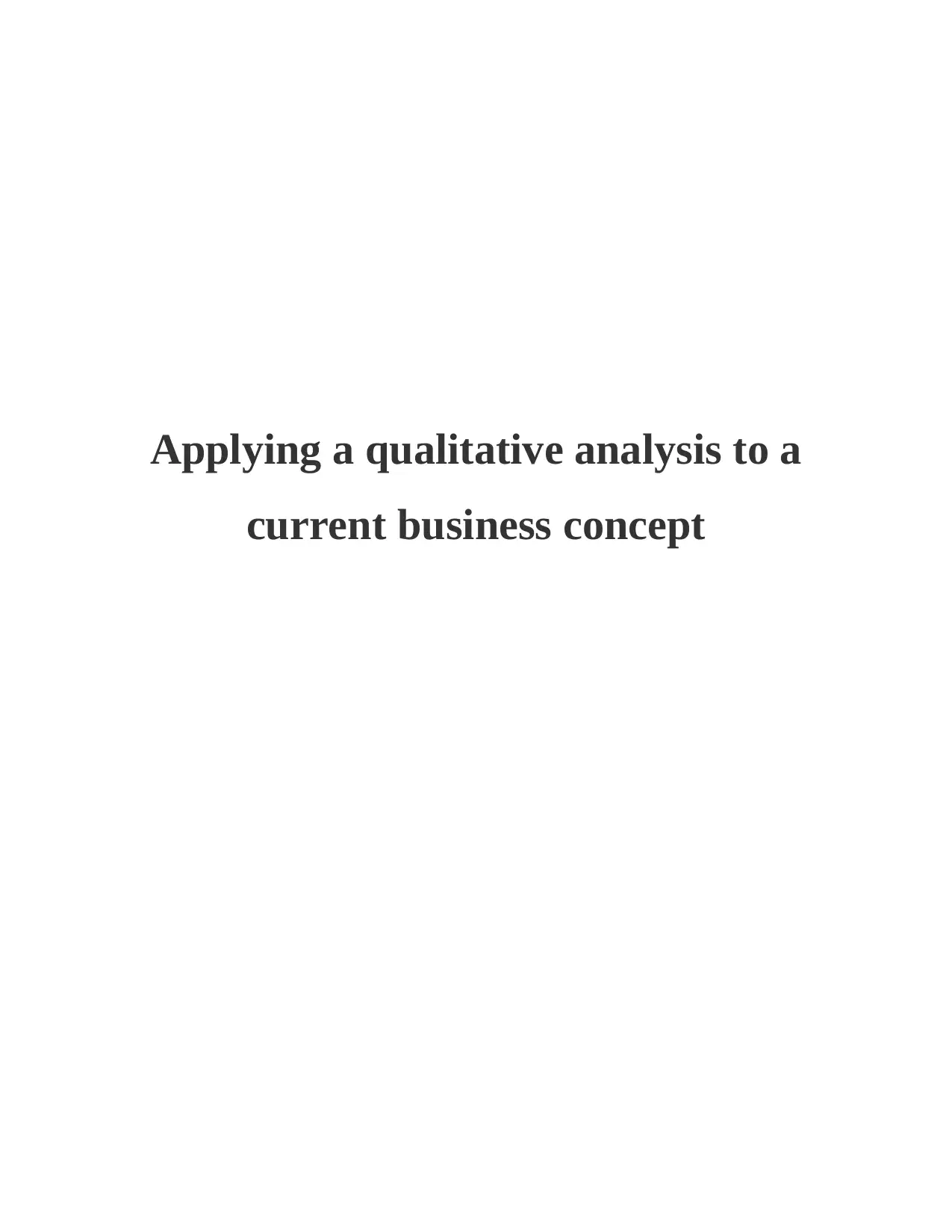
Applying a qualitative analysis to a
current business concept
current business concept
Paraphrase This Document
Need a fresh take? Get an instant paraphrase of this document with our AI Paraphraser
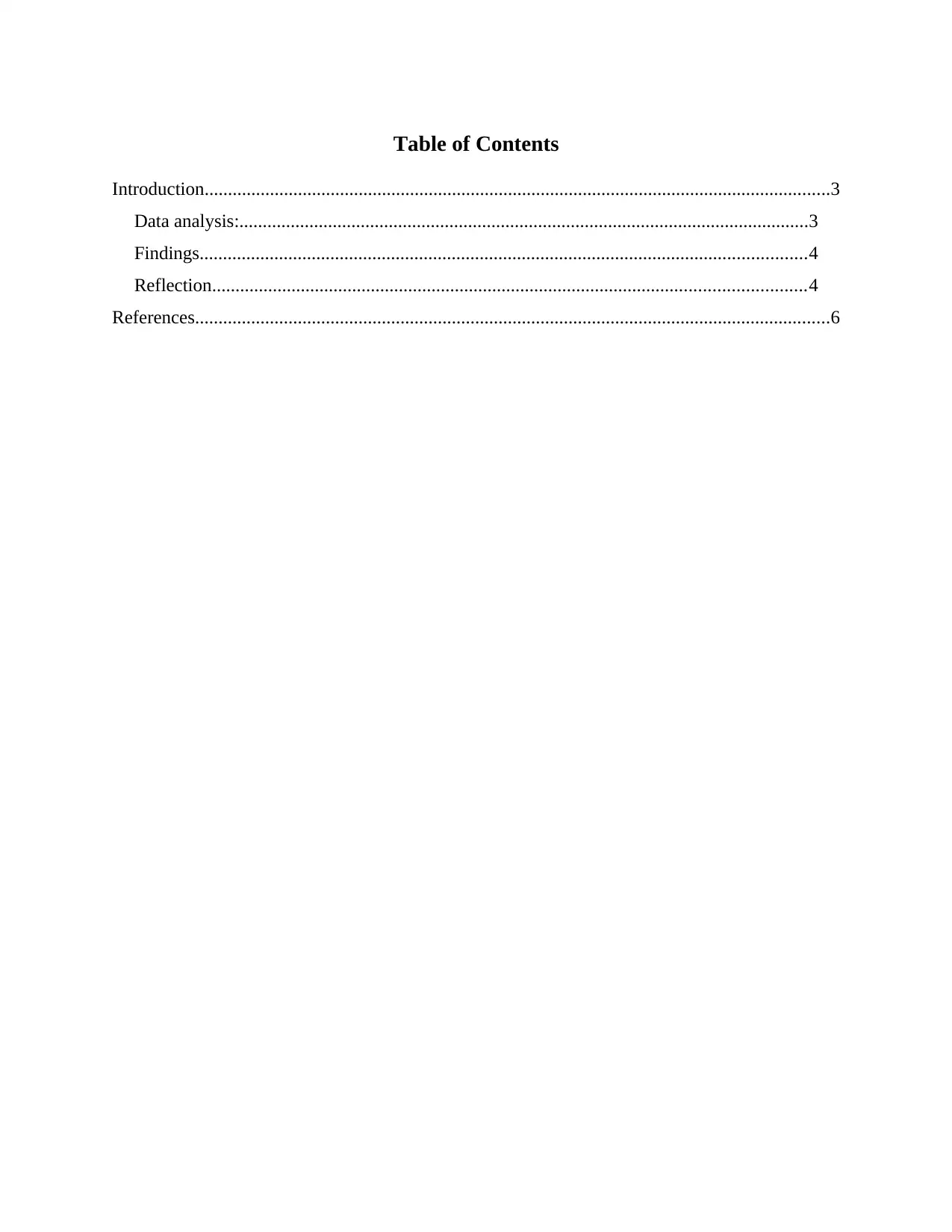
Table of Contents
Introduction......................................................................................................................................3
Data analysis:..........................................................................................................................3
Findings..................................................................................................................................4
Reflection...............................................................................................................................4
References........................................................................................................................................6
Introduction......................................................................................................................................3
Data analysis:..........................................................................................................................3
Findings..................................................................................................................................4
Reflection...............................................................................................................................4
References........................................................................................................................................6
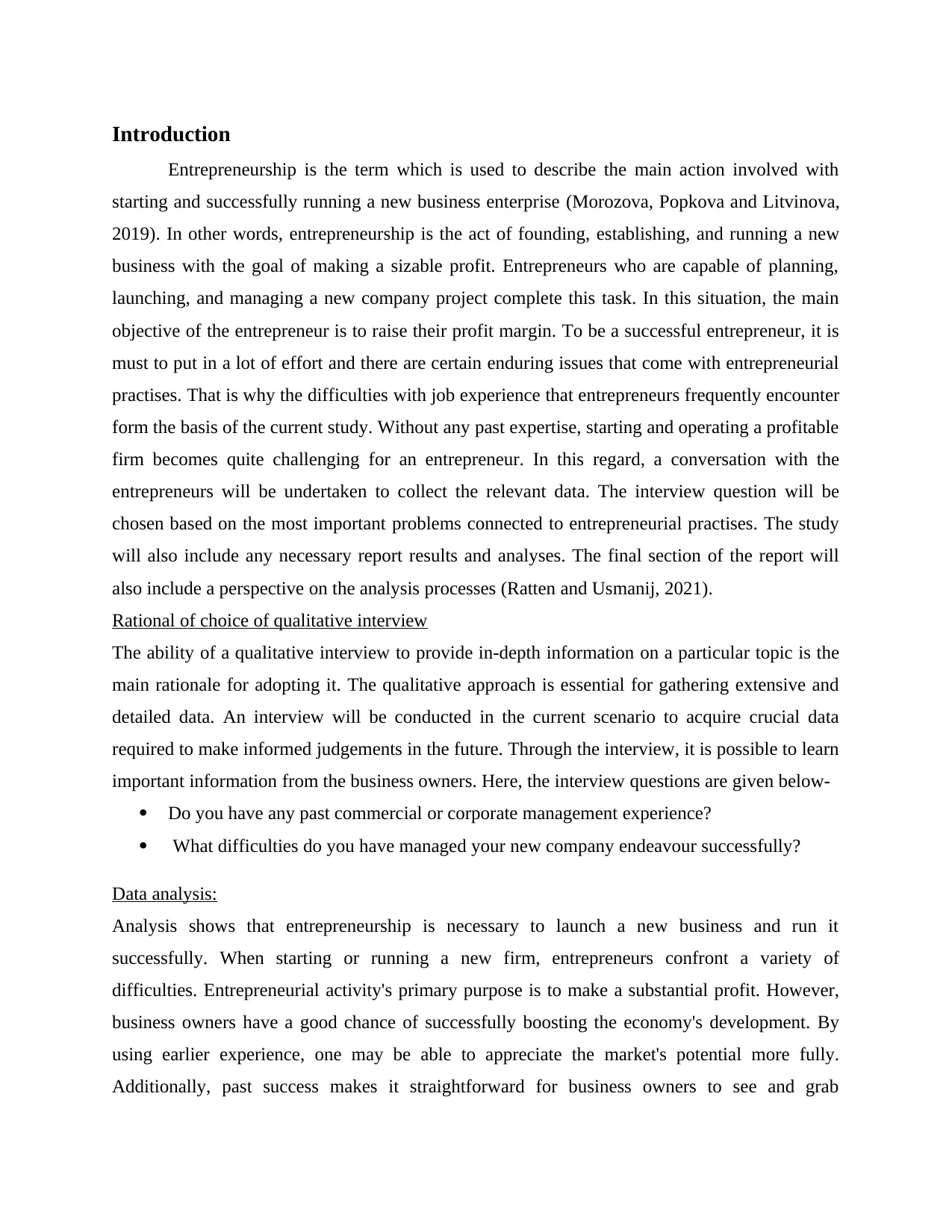
Introduction
Entrepreneurship is the term which is used to describe the main action involved with
starting and successfully running a new business enterprise (Morozova, Popkova and Litvinova,
2019). In other words, entrepreneurship is the act of founding, establishing, and running a new
business with the goal of making a sizable profit. Entrepreneurs who are capable of planning,
launching, and managing a new company project complete this task. In this situation, the main
objective of the entrepreneur is to raise their profit margin. To be a successful entrepreneur, it is
must to put in a lot of effort and there are certain enduring issues that come with entrepreneurial
practises. That is why the difficulties with job experience that entrepreneurs frequently encounter
form the basis of the current study. Without any past expertise, starting and operating a profitable
firm becomes quite challenging for an entrepreneur. In this regard, a conversation with the
entrepreneurs will be undertaken to collect the relevant data. The interview question will be
chosen based on the most important problems connected to entrepreneurial practises. The study
will also include any necessary report results and analyses. The final section of the report will
also include a perspective on the analysis processes (Ratten and Usmanij, 2021).
Rational of choice of qualitative interview
The ability of a qualitative interview to provide in-depth information on a particular topic is the
main rationale for adopting it. The qualitative approach is essential for gathering extensive and
detailed data. An interview will be conducted in the current scenario to acquire crucial data
required to make informed judgements in the future. Through the interview, it is possible to learn
important information from the business owners. Here, the interview questions are given below-
Do you have any past commercial or corporate management experience?
What difficulties do you have managed your new company endeavour successfully?
Data analysis:
Analysis shows that entrepreneurship is necessary to launch a new business and run it
successfully. When starting or running a new firm, entrepreneurs confront a variety of
difficulties. Entrepreneurial activity's primary purpose is to make a substantial profit. However,
business owners have a good chance of successfully boosting the economy's development. By
using earlier experience, one may be able to appreciate the market's potential more fully.
Additionally, past success makes it straightforward for business owners to see and grab
Entrepreneurship is the term which is used to describe the main action involved with
starting and successfully running a new business enterprise (Morozova, Popkova and Litvinova,
2019). In other words, entrepreneurship is the act of founding, establishing, and running a new
business with the goal of making a sizable profit. Entrepreneurs who are capable of planning,
launching, and managing a new company project complete this task. In this situation, the main
objective of the entrepreneur is to raise their profit margin. To be a successful entrepreneur, it is
must to put in a lot of effort and there are certain enduring issues that come with entrepreneurial
practises. That is why the difficulties with job experience that entrepreneurs frequently encounter
form the basis of the current study. Without any past expertise, starting and operating a profitable
firm becomes quite challenging for an entrepreneur. In this regard, a conversation with the
entrepreneurs will be undertaken to collect the relevant data. The interview question will be
chosen based on the most important problems connected to entrepreneurial practises. The study
will also include any necessary report results and analyses. The final section of the report will
also include a perspective on the analysis processes (Ratten and Usmanij, 2021).
Rational of choice of qualitative interview
The ability of a qualitative interview to provide in-depth information on a particular topic is the
main rationale for adopting it. The qualitative approach is essential for gathering extensive and
detailed data. An interview will be conducted in the current scenario to acquire crucial data
required to make informed judgements in the future. Through the interview, it is possible to learn
important information from the business owners. Here, the interview questions are given below-
Do you have any past commercial or corporate management experience?
What difficulties do you have managed your new company endeavour successfully?
Data analysis:
Analysis shows that entrepreneurship is necessary to launch a new business and run it
successfully. When starting or running a new firm, entrepreneurs confront a variety of
difficulties. Entrepreneurial activity's primary purpose is to make a substantial profit. However,
business owners have a good chance of successfully boosting the economy's development. By
using earlier experience, one may be able to appreciate the market's potential more fully.
Additionally, past success makes it straightforward for business owners to see and grab
⊘ This is a preview!⊘
Do you want full access?
Subscribe today to unlock all pages.

Trusted by 1+ million students worldwide
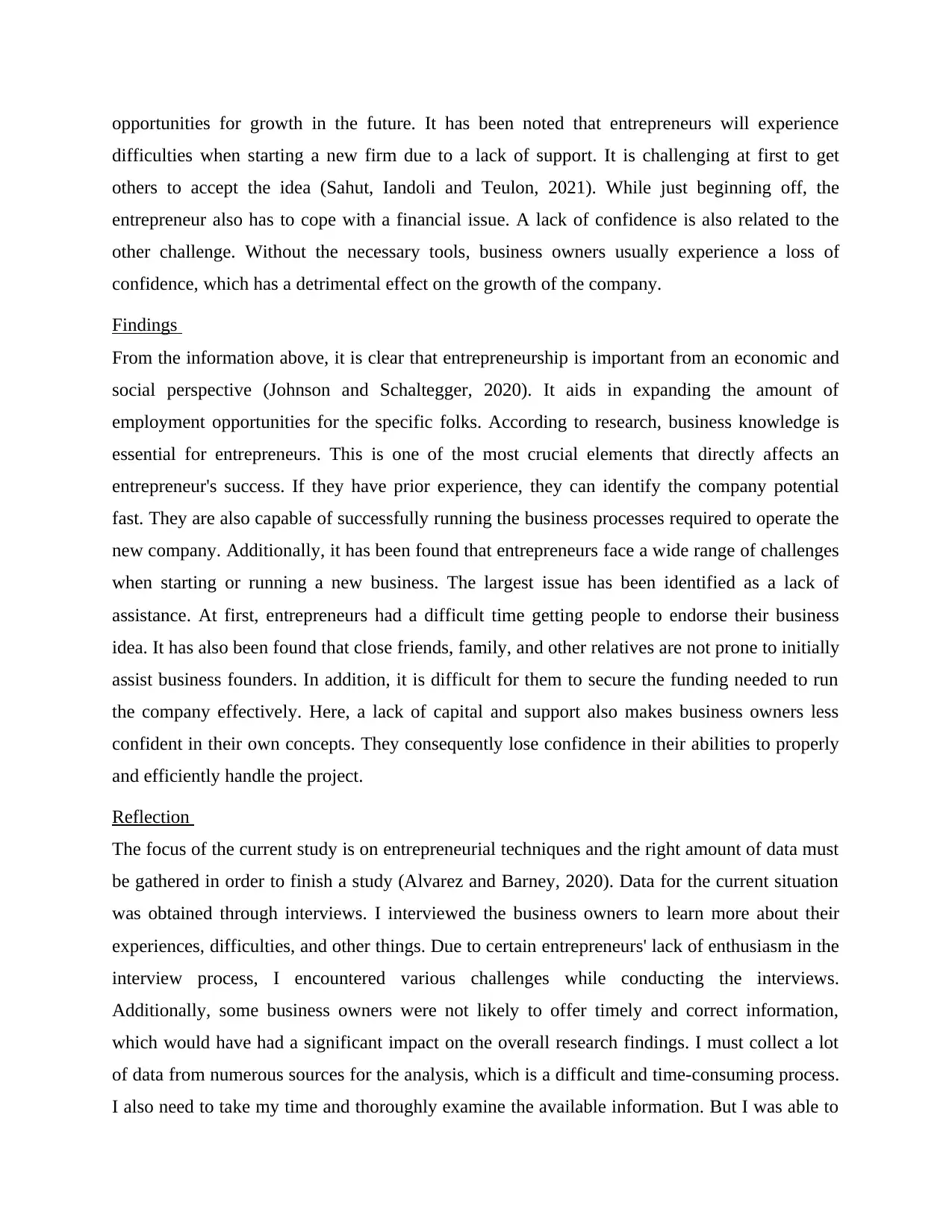
opportunities for growth in the future. It has been noted that entrepreneurs will experience
difficulties when starting a new firm due to a lack of support. It is challenging at first to get
others to accept the idea (Sahut, Iandoli and Teulon, 2021). While just beginning off, the
entrepreneur also has to cope with a financial issue. A lack of confidence is also related to the
other challenge. Without the necessary tools, business owners usually experience a loss of
confidence, which has a detrimental effect on the growth of the company.
Findings
From the information above, it is clear that entrepreneurship is important from an economic and
social perspective (Johnson and Schaltegger, 2020). It aids in expanding the amount of
employment opportunities for the specific folks. According to research, business knowledge is
essential for entrepreneurs. This is one of the most crucial elements that directly affects an
entrepreneur's success. If they have prior experience, they can identify the company potential
fast. They are also capable of successfully running the business processes required to operate the
new company. Additionally, it has been found that entrepreneurs face a wide range of challenges
when starting or running a new business. The largest issue has been identified as a lack of
assistance. At first, entrepreneurs had a difficult time getting people to endorse their business
idea. It has also been found that close friends, family, and other relatives are not prone to initially
assist business founders. In addition, it is difficult for them to secure the funding needed to run
the company effectively. Here, a lack of capital and support also makes business owners less
confident in their own concepts. They consequently lose confidence in their abilities to properly
and efficiently handle the project.
Reflection
The focus of the current study is on entrepreneurial techniques and the right amount of data must
be gathered in order to finish a study (Alvarez and Barney, 2020). Data for the current situation
was obtained through interviews. I interviewed the business owners to learn more about their
experiences, difficulties, and other things. Due to certain entrepreneurs' lack of enthusiasm in the
interview process, I encountered various challenges while conducting the interviews.
Additionally, some business owners were not likely to offer timely and correct information,
which would have had a significant impact on the overall research findings. I must collect a lot
of data from numerous sources for the analysis, which is a difficult and time-consuming process.
I also need to take my time and thoroughly examine the available information. But I was able to
difficulties when starting a new firm due to a lack of support. It is challenging at first to get
others to accept the idea (Sahut, Iandoli and Teulon, 2021). While just beginning off, the
entrepreneur also has to cope with a financial issue. A lack of confidence is also related to the
other challenge. Without the necessary tools, business owners usually experience a loss of
confidence, which has a detrimental effect on the growth of the company.
Findings
From the information above, it is clear that entrepreneurship is important from an economic and
social perspective (Johnson and Schaltegger, 2020). It aids in expanding the amount of
employment opportunities for the specific folks. According to research, business knowledge is
essential for entrepreneurs. This is one of the most crucial elements that directly affects an
entrepreneur's success. If they have prior experience, they can identify the company potential
fast. They are also capable of successfully running the business processes required to operate the
new company. Additionally, it has been found that entrepreneurs face a wide range of challenges
when starting or running a new business. The largest issue has been identified as a lack of
assistance. At first, entrepreneurs had a difficult time getting people to endorse their business
idea. It has also been found that close friends, family, and other relatives are not prone to initially
assist business founders. In addition, it is difficult for them to secure the funding needed to run
the company effectively. Here, a lack of capital and support also makes business owners less
confident in their own concepts. They consequently lose confidence in their abilities to properly
and efficiently handle the project.
Reflection
The focus of the current study is on entrepreneurial techniques and the right amount of data must
be gathered in order to finish a study (Alvarez and Barney, 2020). Data for the current situation
was obtained through interviews. I interviewed the business owners to learn more about their
experiences, difficulties, and other things. Due to certain entrepreneurs' lack of enthusiasm in the
interview process, I encountered various challenges while conducting the interviews.
Additionally, some business owners were not likely to offer timely and correct information,
which would have had a significant impact on the overall research findings. I must collect a lot
of data from numerous sources for the analysis, which is a difficult and time-consuming process.
I also need to take my time and thoroughly examine the available information. But I was able to
Paraphrase This Document
Need a fresh take? Get an instant paraphrase of this document with our AI Paraphraser

gather enough accurate data to give the entire study authenticity and reliability, which enhances
the total level of research study quality. From the interview, I was only able to glean a scant
amount of knowledge that significantly affected the outcomes. In the current study, thematic
analysis—which is based on theoretical analysis—was used. The study is therefore lacking in
numerical and data analysis, which would have increased the study's overall reliability and
authenticity.
the total level of research study quality. From the interview, I was only able to glean a scant
amount of knowledge that significantly affected the outcomes. In the current study, thematic
analysis—which is based on theoretical analysis—was used. The study is therefore lacking in
numerical and data analysis, which would have increased the study's overall reliability and
authenticity.
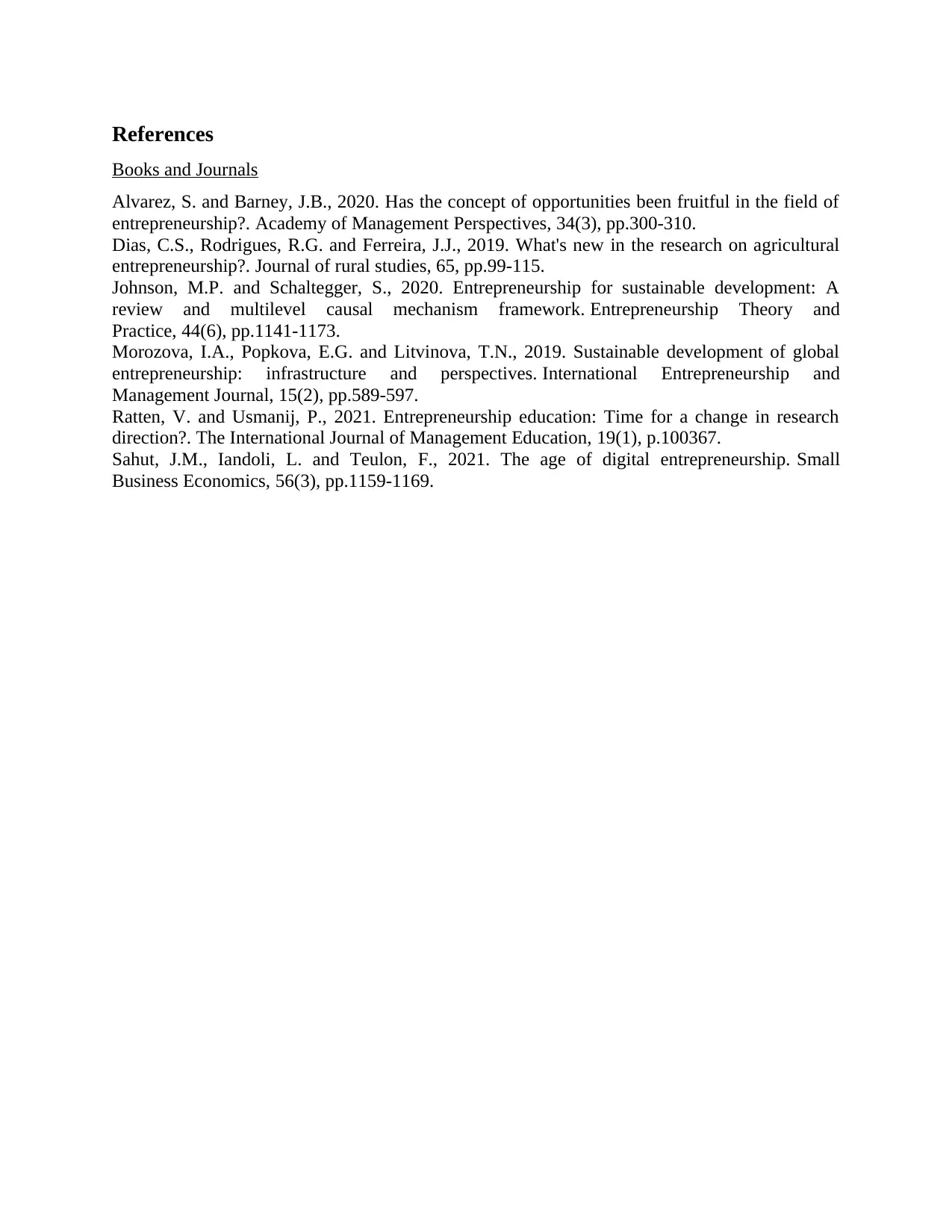
References
Books and Journals
Alvarez, S. and Barney, J.B., 2020. Has the concept of opportunities been fruitful in the field of
entrepreneurship?. Academy of Management Perspectives, 34(3), pp.300-310.
Dias, C.S., Rodrigues, R.G. and Ferreira, J.J., 2019. What's new in the research on agricultural
entrepreneurship?. Journal of rural studies, 65, pp.99-115.
Johnson, M.P. and Schaltegger, S., 2020. Entrepreneurship for sustainable development: A
review and multilevel causal mechanism framework. Entrepreneurship Theory and
Practice, 44(6), pp.1141-1173.
Morozova, I.A., Popkova, E.G. and Litvinova, T.N., 2019. Sustainable development of global
entrepreneurship: infrastructure and perspectives. International Entrepreneurship and
Management Journal, 15(2), pp.589-597.
Ratten, V. and Usmanij, P., 2021. Entrepreneurship education: Time for a change in research
direction?. The International Journal of Management Education, 19(1), p.100367.
Sahut, J.M., Iandoli, L. and Teulon, F., 2021. The age of digital entrepreneurship. Small
Business Economics, 56(3), pp.1159-1169.
Books and Journals
Alvarez, S. and Barney, J.B., 2020. Has the concept of opportunities been fruitful in the field of
entrepreneurship?. Academy of Management Perspectives, 34(3), pp.300-310.
Dias, C.S., Rodrigues, R.G. and Ferreira, J.J., 2019. What's new in the research on agricultural
entrepreneurship?. Journal of rural studies, 65, pp.99-115.
Johnson, M.P. and Schaltegger, S., 2020. Entrepreneurship for sustainable development: A
review and multilevel causal mechanism framework. Entrepreneurship Theory and
Practice, 44(6), pp.1141-1173.
Morozova, I.A., Popkova, E.G. and Litvinova, T.N., 2019. Sustainable development of global
entrepreneurship: infrastructure and perspectives. International Entrepreneurship and
Management Journal, 15(2), pp.589-597.
Ratten, V. and Usmanij, P., 2021. Entrepreneurship education: Time for a change in research
direction?. The International Journal of Management Education, 19(1), p.100367.
Sahut, J.M., Iandoli, L. and Teulon, F., 2021. The age of digital entrepreneurship. Small
Business Economics, 56(3), pp.1159-1169.
⊘ This is a preview!⊘
Do you want full access?
Subscribe today to unlock all pages.

Trusted by 1+ million students worldwide

1 out of 7
Related Documents
Your All-in-One AI-Powered Toolkit for Academic Success.
+13062052269
info@desklib.com
Available 24*7 on WhatsApp / Email
![[object Object]](/_next/static/media/star-bottom.7253800d.svg)
Unlock your academic potential
Copyright © 2020–2026 A2Z Services. All Rights Reserved. Developed and managed by ZUCOL.





